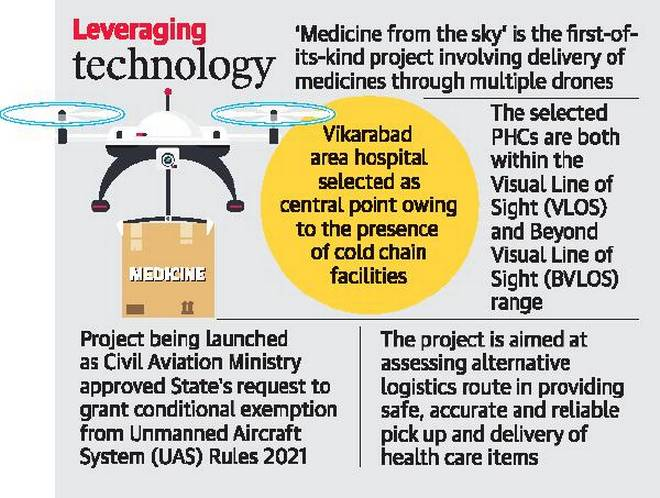Medicine from the Sky Project: Telangana | 19 May 2021
Why in News
Recently, the Telangana government has selected 16 Primary Healthcare Centres (PHCs) for pilot testing the ambitious ‘Medicine from the sky’, the first-of- its-kind project.
Key Points
- About:
- The project involves delivery of medicines through multiple drones.
- The project is being launched following the approval granted by the Civil Aviation Ministry.
- The Ministry has granted conditional exemption to the Telangana Government from the Unmanned Aircraft System Rules 2021 for conducting experimental Beyond Visual Line of Sight (BVLOS) drone flights for delivery of vaccines.
- The project would be launched in three waves starting with a pilot followed by mapping the route network for operation of drones for delivering vaccine/medicine in the desired community health centres and PHCs.
- Collaborators:
- Telangana government, World Economic Forum and HealthNet Global.
- HealthNet Global is a private limited company which provides quality affordable health plans for individuals, families, Medicare and businesses.
- Telangana government, World Economic Forum and HealthNet Global.
- Aim:
- To assess alternative logistics routes in providing safe, accurate and reliable pick up and delivery of health care items like medicines, Covid-19 vaccines, units of blood and other lifesaving equipment from the distribution centre to specific locations and back.
- To ensure healthcare equity for rural areas.
- Significance:
- The model, once successful, would enable deliveries from district medical stores and blood banks to PHCs, Community Healthcare Centres (CHCs) and further from PHCs/CHCs to central diagnostic laboratories.
- It has the potential to disrupt the healthcare industry and save many lives during emergencies and in less accessible geographies.
- Other Projects involving Use of Drones:
- Similar permission was granted to the Indian Council of Medical Research (ICMR) for conducting feasibility study of Covid-19 vaccine delivery using drones, in collaboration with IIT-Kanpur.
- The International Crops Research Institute (ICRISAT) was permitted to deploy drones for agricultural research activities, apart from some agriculture universities and educational institutions.
Drones
- Drone is a layman terminology for Unmanned Aircraft (UA). There are three subsets of Unmanned Aircraft- Remotely Piloted Aircraft, Autonomous Aircraft and Model Aircraft.
- Remotely piloted aircraft have been divided into five categories based on their weight-
- Nano : Less than or equal to 250 grams.
- Micro : From 250 grams to 2kg.
- Small : From 2 kg to 25kg.
- Medium : From 25kg to 150kg.
- Large : Greater than 150kg.
- Under the Drone Regulation in 2018, the Ministry of Civil Aviation partitioned the Air space into Red Zone (flying not permitted), Yellow Zone (controlled airspace), and Green Zone (automatic permission).
Beyond Visual Line of Sight
- About:
- It is a term relating to the operation of Unmanned Aerial Vehicles (UAVs) and drones at distances outside the normal visible range of the pilot.
- BVLOS flights typically require additional equipment and extra training and certification, and are subject to permission from aviation authorities.
- Unmanned Aircraft System Rules 2021 states that drones will not be allowed to operate BVLOS, which would limit the use of these gadgets to surveys, photography, security and various information gathering purposes.
- Advantages:
- They are more cost-effective and efficient, as there are fewer takeoff and landing phases, so the UAV will cover more ground in a single mission.
- BVLOS flights require less human intervention as some or all of the missions may be automated. They may also allow easier access to remote or hazardous areas.
- BVLOS capabilities enable a drone to cover far greater distances.
- Risk:
- These operations carry more safety concerns due to the fact that the pilot may only be observing potential obstacles via a remote camera feed, or, in the case of automated flights, there may be no human observation at all.
- There is a risk of collisions with other aircraft, or damage to property and people, especially when flights take place in non-segregated airspace.

